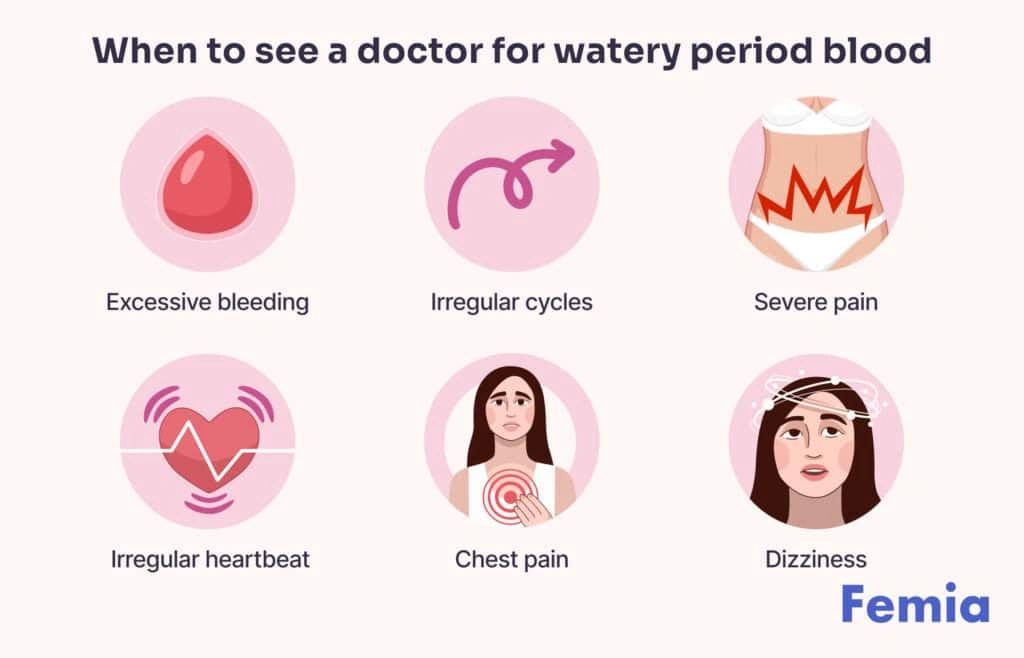
That Sudden “Wait, Is This Normal?” Moment
You know those moments that grab you by the shoulders and make you freeze in the bathroom? Maybe you’re changing your pad (already running five minutes late for work) and notice your period blood is looking… weirdly watery this time. Cue the mini panic—did my cycle always look like this? Is something wrong?
Real talk: I’ve been in that spot more times than I’d like to admit. Staring at my underwear, heart speeding up, already imagining a thousand possible problems. So, first things first—let’s breathe. Because while watery menstrual blood can look odd or even worrying, it’s usually not some secret emergency. Actually, there are plenty of reasons why a woman is likely to produce watery menstrual blood, and most of them are nothing to freak out over.
If you’ve found yourself here, looking for answers, I want you to feel less alone and a LOT more confident. Let’s chat about all the natural, surprisingly common reasons your period might get a little “runny.” And hey, I’ll share some personal stories along the way because none of this has to feel clinical or cold.
Hormones: Tiny But Mighty
Can a Little Hormone Really Do All That?
Oh, hormones. They’re like the moody directors running the show behind the curtain of your cycle. Estrogen and progesterone, in particular, control so much of what your uterine lining actually does. Did you know a simple dip in estrogen can turn your usually robust, thick, dark-red period into a much thinner, almost watery flow? Think less “movie murder scene,” more “a glass you spilled too much water into.”
Why does this happen? When estrogen drops (which it does naturally at various points in your cycle or life), the uterine lining isn’t as thick. That means when it sheds during your period, there’s less dense tissue—and the blood mixes more with other fluids, making it look runny or diluted. According to research on the hormonal cycle’s link to blood consistency, this is completely expected at certain times of the month or stages in life.
Estrogen Rollercoaster: My Messy Moment
I can’t tell you how many times my own period has flipped the script on me. One month: heavy, dark, the works. Next time: so watery I worried I was getting sick. But after talking to my doctor and soul-searching on Google at 2am, I learned that these hormone fluctuations are normal, especially if you’ve had a stressful stretch, changed your routine, or (relatable) over-exercised for a bit. Who knew too many HIIT classes could kick estrogen so hard?
Birth Control: The Sneaky Game-Changer
Can the Pill or Patch Do This?
If you’ve started, stopped, or switched hormonal birth control recently, join the club of “Why does my period look like water now?” Birth control, especially the ones loaded with progesterone (think: pill, IUD, implant, patch—honestly, take your pick), can intentionally thin your uterine lining. Because a thinner lining is harder for a fertilized egg to stick to (aka, less risk of pregnancy)… which, by the way, means less to shed each month.
The kicker? That makes your period lighter, often shorter, and—yup—sometimes super watery. For a lot of people, that’s actually a PERK of birth control, not a reason to worry! If you want more on this topic, drop into the deep-dive on reasons why a woman is likely to produce watery menstrual blood; it details how birth control changes things and what’s actually normal.
Timeline for the Switch-Up
Your body’s not a robot. After starting or changing your birth control, expect things to be a little “off” for a few cycles. For me, my first round on the patch had zero drama—but my new IUD made my periods go watery for the first three months. Totally manageable, just a bit surprising.
Hydration Habits: Is Your Body Just Thirsty?
Can Not Drinking Enough Water Make Your Period Watery?
This one kind of blew my mind. Dehydration doesn’t just cause headaches and dry lips… it can sneakily mess with your period’s appearance, too. How? Well, when you’re not sipping enough H2O, your body has less to work with, so your blood’s viscosity (its “thickness”) drops. Period blood can literally look lighter and more diluted, especially on a hot day or after sweaty workouts. Learned it the awkward way—after a summer road trip, all junk food and barely a sip of water, I got my lightest, most watery period ever.
Quick Check: Are You Dehydrated?
Here’s my lazy-hack checklist: Are you peeing less? Is your urine darker than lemonade? Are you thirsty all the time? If yes to any of these, chug a glass (or three) and see if your flow evens out over the next cycle. Sometimes the solution is as simple as keeping a water bottle in your bag.
It’s Not Always the Hormones
Does Anything Else Come Into Play?
Short answer: Yep. There’s a smattering of other reasons why a woman is likely to produce watery menstrual blood. Some are purely routine, others might need a bit more attention—but you don’t need to panic.
- It’s the Start (or End) of Your Period: Ever notice that first day, your flow’s super light and watery, or even turns watery right before it ends? That’s because, at the start, it’s mostly “new” blood (hasn’t had time to get thick or dark). At the end, there’s less blood left to shed—what comes out is mixed with more cervical/vaginal fluid, so it’s thinned out too. It’s kind of like adding a splash of water to juice that was already at the bottom of the glass.
- There’s More Vaginal Discharge This Cycle: When your period blood mixes with extra vaginal discharge, that can also make it look watery. This is especially true if you’ve been ovulating particularly “wet” this month—yep, your body likes curveballs.
- Medications or Health Conditions: Taking blood thinners (like for a heart condition) or certain medications can thin your blood and water down your flow. And sometimes—less fun—conditions like PCOS, fibroids, or even infections can change your period’s texture and appearance (accompanied by other symptoms like weird pain, big clots, or new odors—so keep an eye out).
Table: Spotting the Differences
| Situation | Watery Blood? | Clues |
|---|---|---|
| Start/end of period | Common | No extra symptoms; just timing |
| After new birth control | Very common | Follows med change; usually resolves |
| Dehydration | Occasional | Thirst, darker urine |
| Health condition | Sometimes | Pain, odor, big clots, cycle change |
Pregnancy Surprises: Is Watery Blood a Sign?
Could I Actually Be Pregnant?
You know where this question leads, right? Watery spotting or a whisper-light flow can have you spiraling down the “Am I pregnant?” rabbit hole. So let’s chat about watery period blood sign of pregnancy—because sometimes, yes, it could be an early sign. Not always, but sometimes.
Here’s what happens: implantation bleeding (when a fertilized egg attaches to your uterus) shows up as super light, watery, or pinkish spotting about 10–14 days after conception. It’s not a real “period,” so it’s usually a spot or two—not several days of flow.
Real Talk: When My Cousin Found Out
This is a true story—my cousin thought she was just having another odd cycle, only to realize that her watery spotting was actually a sign of implantation. Cue the squeals and “Wait, really?” after the test came back positive. If you suspect pregnancy—especially if that watery blood is very different than your typical period—grab a dollar-store or fancy digital test. Trust yourself. And if you need more insight, the blog on watery period blood sign of pregnancy goes deeper into the details.
Is It Ever Something to Worry About?
What’s Normal vs. Needing Attention?
Let’s face it: most of us have a “default” setting for our period. The shade, the texture, how much it soaks through a pad, even the PMS mood that tags along. But when things start to look truly out of character—like your period is suddenly watery AND super heavy, or it sticks around for way longer than usual, or brings buckets of pain—it’s time to pay attention.
There are a handful of reasons why a woman is likely to produce watery menstrual blood that are totally routine. But sometimes, persistent changes can point to stuff like:
- Polycystic ovary syndrome (PCOS)
- Uterine fibroids
- Perimenopause (the wild hormonal swings that happen before menopause proper)
- Certain infections (PID or others)
If you spot other weird symptoms—like fevers, sharp pelvic pain, random huge clots, or odd smells—take those seriously. Get checked out. Better safe, right?
Remember: You Know YOU Best
Biggest lesson I’ve learned? You know your own body’s normal. What’s a red flag for me might not be anything for you, and vice versa. Trust your gut. Track your cycles if you’re not already (free apps everywhere, or just doodle in your notes app). Noticing patterns makes the weird stuff stand out, and gives your doctor better info if you do end up needing to chat.
Small Win: It’s (Usually) Just a Curveball
Periods are like the seasons: you know the basics, but every now and then, you get a heatwave or a soggy downpour. So if you’re seeing watery period blood, you’re not alone—literally millions of us have had the awkward “Why is it like this?” text exchange with friends, or that late-night Google spiral.
Here’s what I want you to remember: most of the time, watery blood is a hiccup in your body’s normal rhythm. It could be hormones, a new birth control, your hydration level, or just your usual cycle mixing things up for fun. For extra peace of mind, revisit the guides on reasons why a woman is likely to produce watery menstrual blood and watery period blood sign of pregnancy whenever you need them.
Let’s Wrap This Up (And Breathe!)
If you’ve made it this far, you probably care a lot about your health (and maybe, like me, worry a bit more than your friends let on). The truth? Your body does some strange, creative things—and watery menstrual blood is usually one of its harmless, if slightly confusing, tricks. Sometimes it’s because of low estrogen, new birth control, more discharge, greater hydration, or even just the normal up-and-down of your unique cycle.
Sure, if it’s a sudden, stubborn change—especially paired with pain, exhaustion, odd smells, or super heavy bleeding—check in with your healthcare provider. Otherwise, pat yourself on the back for caring enough to get informed.
Try to see these little changes as a nudge: drink more water, track those cycles, maybe loosen up if you’ve been pushing yourself too hard lately. And if you want to swap stories or ask questions, drop a comment or chat with your doctor. You know your body best, and you deserve to feel comfortable in it—even when it throws you a curveball or two. Go easy on yourself (and don’t forget that water bottle today!).

























Leave a Reply
You must be logged in to post a comment.